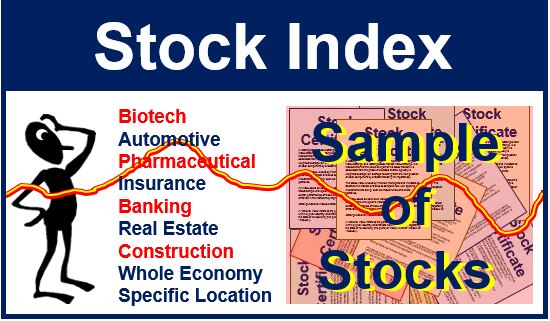Stock Index – definition and meaning
A stock index, also known as a share index or a stock market index, is a measurement of the value of a part of the stock market. It is calculated from the prices of selected shares, typically a weighted average (an average resulting from the multiplication of each component by a factor reflecting its importance).
The stock index is used by financial managers and investors to describe the market, and also to compare how well specific investments are doing, such as mutual funds and share portfolios.
An index could be seen as a ‘basket’ of shares that represent a broad sample of a specific industry, sector or economy. The overall performance of these shares provides a good indication of trends in the market they represent.

National Indexes
A ‘national index’ refers to the performance of the stock market within a given country, and reflects how investors feel regarding the state of its economy (the plural of ‘index’ is either ‘indices’ or ‘indexes’).
The most commonly quoted stock indexes are national indexes that consists of the shares of large companies listed on a country’s biggest stock exchanges, such as the British FTSE 100 (owned by the London Stock Exchange and the Financial Times), the US S&P 500 (operated by Standard & Poor’s) and the Japanese Nikkei 225, which is listed in the First Section of the Tokyo Stock Exchange.
Stock indexes may also be groups of exchanges such as the OMX Nordic 40 or the Euronext 100, based on exchange as with the NYSE US 100 or NASDAQ-100, or regional such as the FTSE Developed Asia Pacific Index or FTSE Developed Europe Index.
The Wilshire 5000 is America’s largest index – it includes every US-based company quoted in the country’s major stock exchanges.
Specialized indexes
Some indexes are specialized, and focus on just specific sections of the market. For example, the Wilshire US REIT monitors over eighty US real estate investment trusts, while the Morgan Stanley Biotech Index tracks 36 US companies in the biotech industry.
The NYSE Arca Major Market Index consists of twenty blue-chip company stocks. Seventeen of them are also quoted in the Dow Jones Industrial Average. Traders, especially those dealing with futures and options, base their operations on this index.
An index exists for virtually every conceivable sector of the stock market and the economy.
Global indexes
These track some of the largest companies in the world. The MSCI World Index, which is maintained by MSCI Inc. (formerly Morgan Stanley Capital International), measures 1,500 stocks from every advanced economy worldwide.
The MSCI World Index is commonly used as a benchmark for global stock funds.
You cannot trade directly in stock indexes – they are not ‘products’. Stock indexes exist only to provide data, it is not possible to trade a portion of an index as such.
It is possible, however, to trade indexes through derivatives such as options, futures and CFDs.

